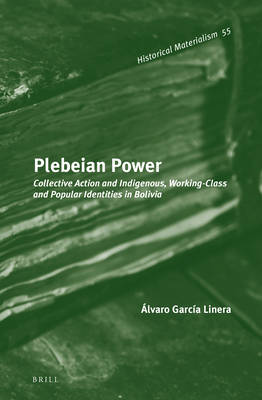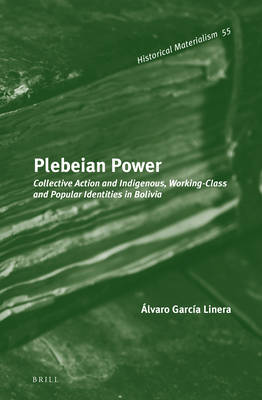
- Afhalen na 1 uur in een winkel met voorraad
- Gratis thuislevering in België vanaf € 30
- Ruim aanbod met 7 miljoen producten
- Afhalen na 1 uur in een winkel met voorraad
- Gratis thuislevering in België vanaf € 30
- Ruim aanbod met 7 miljoen producten
Zoeken
Plebeian Power
Collective Action and Indigenous, Working-Class and Popular Identities in Bolivia
Álvaro García Linera
€ 230,45
+ 460 punten
Omschrijving
In addition to his role as Evo Morales's vice-president, Álvaro García Linera is one of Bolivia's foremost intellectuals. With a theoretical trajectory beginning in efforts to combine Marxism and Indianism, then developed in reaction to the neoliberal turn of the 1980s and in contact with the mass social movements of recent years, García Linera's Plebeian Power can be read as both an evolving analysis of Bolivian reality through periods of great social change, and as an intellectual biography of the author himself. Informed by such thinkers as Marx, Bourdieu and René Zavaleta, García Linera reflects on the nature of the state, class and indigenous identity and their relevance to social struggles in Bolivia.
English translation of La potencia plebeya: Acción colectiva e identidades indígenas, obreras y populares en Bolivia published by Siglo del Hombre Editores and CLASCO in 2007.
English translation of La potencia plebeya: Acción colectiva e identidades indígenas, obreras y populares en Bolivia published by Siglo del Hombre Editores and CLASCO in 2007.
Specificaties
Betrokkenen
- Auteur(s):
- Uitgeverij:
Inhoud
- Aantal bladzijden:
- 352
- Taal:
- Engels
- Reeks:
- Reeksnummer:
- nr. 55
Eigenschappen
- Productcode (EAN):
- 9789004254435
- Verschijningsdatum:
- 11/04/2014
- Uitvoering:
- Hardcover
- Formaat:
- Genaaid
- Afmetingen:
- 163 mm x 239 mm
- Gewicht:
- 698 g

Alleen bij Standaard Boekhandel
+ 460 punten op je klantenkaart van Standaard Boekhandel
Beoordelingen
We publiceren alleen reviews die voldoen aan de voorwaarden voor reviews. Bekijk onze voorwaarden voor reviews.








